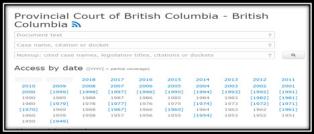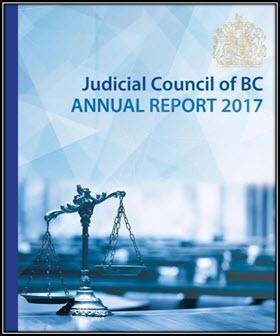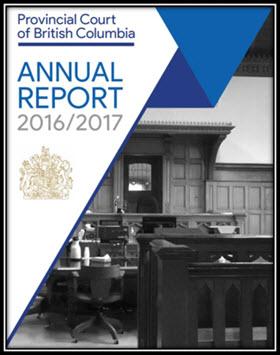Yes, the Provincial Court of BC and its judges are accountable!
Updated August 2024
You sometimes hear people say that our judges and courts aren’t accountable, but that’s not true. Both individual judges and the courts they serve in are accountable for their decisions and actions in many ways.
It’s essential to a democratic society that judges be able to decide all cases impartially, even when the government is a party or politicians have an interest in the outcome. To ensure impartial judicial decisions, democracies have independent courts where judges can’t be fired or otherwise penalized if they decide a case against the government or a powerful individual. But our courts’ judicial independence is intended to protect all Canadians, not judges, and it doesn’t mean our judges and courts aren’t accountable.
Judicial independence and the rule of law depend on the public having trust in their courts and judges. Judges recognize this trust cannot be taken for granted – it must be earned and maintained, and being accountable is essential to that trust. For these reasons, judges are accountable to the public for their decisions and conduct, and courts are accountable for the way they manage their workloads and budgets.
How judges are accountable
Let’s start with judges. First, trial judges are accountable to appeal courts for their decisions. If they make a mistake in deciding what facts have been proven in a trial or in applying the law to those facts, their decision can be appealed and reversed.
Moreover, judges are required to explain the decisions they make with reasons – it’s part of their accountability and a duty they owe to the public as well as to the parties involved in a court case. In criminal cases, the Supreme Court of Canada has said that judges’ reasons must be “reasonably intelligible to the parties and provide the basis for meaningful appellate review of the correctness of the trial judge’s decision”. If a judge’s reasons do not meet that standard, their decision can be overturned by an appeal court.
Next, everything said in a trial or hearing is recorded and almost all proceedings are open to the public. As a result, the media and the public can attend, report and comment on judges’ work and how the courts operate, and they do. (The few exceptions involve special circumstances where the law permits a judge to order that a hearing be closed, usually to protect the privacy of children or vulnerable people.)
In some cases, judges’ reasons are posted online so the public as well as the parties can read and assess them. BC Provincial Court judges hear more than 100,000 cases a year, and give oral (spoken) reasons for many decisions.

But in more complex cases they provide written reasons for judgment, and many of these can be found on CanLII, a free online legal information platform. You’ll also find recently posted reasons on our website home page.
In high profile cases, the Court makes efforts to post written reasons on its website the day the judge delivers them in the courtroom, and transcripts of oral reasons as soon as possible. More and more often these days, media reports on judges’ decisions are providing links to the judgment so you can read it yourself and decide what you think about the judge’s reasoning. You may not agree, but you’ll understand why the judge decided as they did.
In addition to being accountable for their decisions and reasons, judges are subject to disciplinary proceedings for misconduct. The BC Provincial Court’s complaint procedure is prominently displayed on it website. And in its annual reports the Court describes all the complaints received about the Court’s judges and judicial justices each year and explains the action taken.
To assist judges and judicial justices with difficult ethical and professional issues and to assist members of the public to better understand the judicial role, the BC Judicial Council has adopted the Ethical Principles for Judges published by the Canadian Judicial Council in 2021, except for its commentary on “Post-Judicial Careers” in s. 5.E.2 restricting the types of activities a judge can engage in upon leaving the judicial office and returning to the legal profession.

To represent the public in the administration of the Court, the BC Provincial Court Act established the Judicial Council of BC. Consisting of nine people drawn from the public, lawyers and judges, its responsibilities include improving the quality of the Court’s services, continuing judicial education, maintaining a judicial code of ethics, screening applicants for appointment as judges and judicial justices, and undertaking inquiries into the conduct of judges and judicial justices when necessary.
Judicial Council informs the public about its activities in annual reports, and the Attorney General of BC may request a report from Judicial Council on a specific matter.
As part of its public accountability, BC’s Judicial Council has been a leader in providing transparency about the demographics of lawyers who apply for appointment to the Court, the criteria it uses for assessing applicants, and the demographics of applicants approved as suitable for appointment.
Its Annual Reports include statistics on the age, gender, region, and practice experience of applicants as well as any ethnic or cultural background they volunteer. In 2013 the Canadian Bar Association described BC Judicial Council’s publication of diversity statistics as “a model of transparency in the judicial appointments process”.
How the Provincial Court of British Columbia is accountable

The BC Provincial Court also publishes annual reports to keep the public informed about its work. These reports contain information about the demographics of those appointed as judges and judicial justices by the provincial government.
In 2004 the Court established operational standards to assess its ability to manage its caseload effectively. Committed to meeting high standards of efficiency and effectiveness, the Court set goals for the time in which it would like to be able to complete each type of proceeding, and updates these self-imposed standards from time to time.
The Court includes updates on its progress in meeting many of these standards in its Annual Reports. These updates include some of the most detailed metrics reported by any court in Canada.
In addition, the Court issues Time to Trial reports twice a year. These reports measure the estimated time until various types of court proceedings can be routinely scheduled in 69 court locations in BC and compare them with the Court’s standard for that proceeding. Like the Annual Reports, they are posted on the Court’s website and links to them are shared on the Court's social media accounts.
Summing up
So, the BC Provincial Court and its judges are accountable in many ways:
• recorded proceedings
• open courts
• the requirement for reasons
• appeals
• discipline for misconduct
• the Court’s annual and semi-annual reports
• BC Judicial Council’s annual reports
But accountability doesn’t mean making decisions that coincide with public opinion or what politicians want. It is a crucial characteristic of democracies governed by the rule of law that courts make impartial decisions based on evidence and the law. If the government disagrees it can change the law, or in the case of decisions about the Canadian Charter of Rights and Freedoms, use the “notwithstanding clause”, a provision in the Charter (section 33) that allows a government to override certain sections of the Charter for a period of five years, renewable for additional five year periods.
Commenting on the Court’s accountability, Acting Chief Judge Melissa Gillespie said, “The mission of the Provincial Court of British Columbia is to impartially and consistently provide a forum for justice that assumes equal access for all, enhances respect for the rule of law, and builds confidence in the administration of justice. Being accountable is an essential aspect of building the respect and confidence that is so essential to maintain the rule of law in a democratic society. As a result, accountability is a high priority for the Court.”
